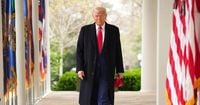As the global economic landscape shifts, the ramifications of President Donald Trump's recently announced tariffs are beginning to unfold, stirring anxiety among investors and industry leaders alike. The headline of a recent article published on April 2, 2025, captures the sentiment: "Stock Market Pain Just Getting Started. ‘This is How You Sabotage the World’s Economic Engine.’" The implications of these tariffs are vast, with experts warning that they could trigger economic turmoil not only in the United States but across the globe.
For years, Trump has championed tariffs as a means to protect American industries, but his latest round of import taxes is set to escalate tensions with foreign governments. This expansion of the trade war is expected to provoke retaliation, which could have a cascading effect on the global economy. The tariffs, described as "reciprocal," range from 10% for some countries to a staggering 54% for others, marking a significant departure from the narrower tariffs he implemented during his first term.
Olu Sonola, head of U.S. economic research at Fitch Ratings, weighed in on the potential fallout, stating, "This is a game changer, not only for the U.S. economy but for the global economy. Many countries will likely end up in a recession. You can throw most forecasts out the door, if this tariff rate stays on for an extended period of time." Sonola's comments underscore the gravity of the situation, as the levels of tariffs being introduced haven't been seen since 1910, raising concerns about a prolonged economic downturn.
The administration's approach has left little room for diplomacy, as a senior White House official declared, "This is not a negotiation. It’s a national emergency." This stark statement signals a shift towards a more aggressive trade strategy, with foreign leaders likely to respond in kind. The European Union has already threatened countermeasures by mid-April, while Canada is preparing its own retaliatory actions, illustrating the precarious nature of international trade relations.
Critics of the tariffs, including senior automotive executives, have voiced their concerns about the unpredictability of the administration's tactics. One executive labeled the 25% tariffs on foreign-built vehicles and auto parts as "process salad," highlighting the confusion and lack of clarity surrounding the new trade policies. Dan Ives, global head of technology research at Wedbush Securities, echoed these sentiments, stating, "We would characterize this slate of tariffs as worse than the worst-case scenario." Despite the grim outlook, Ives remains hopeful for negotiations in the coming months, suggesting that some avenues for resolution may still exist.
However, the uncertainty surrounding the trade war is palpable, with many analysts warning of unintended consequences. David Beckworth, a former U.S. Treasury economist, remarked, "Trump just threw a match on an explosive tinder pile of already weakened inflation concerns. These new tariffs are a perfect recipe for stagflation and a lost midterm elections." This sentiment reflects widespread fears that the tariffs could exacerbate existing economic challenges, leading to higher prices and reduced consumer spending.
Indeed, the impact of these tariffs is likely to be felt by ordinary households across the nation. Jake Colvin, president of the National Foreign Trade Council, cautioned that consumers should expect to see higher prices for a range of goods, stating, "There is simply no way to mitigate all of the added costs of inputs to finished goods from the administration’s complex and growing web of tariffs." From groceries to home renovations and auto insurance, the potential for increased costs looms large, raising questions about the long-term effects of Trump's trade policies.
As the situation continues to evolve, the uncertainty surrounding the tariffs and their implications for the economy remains a pressing concern. The automotive industry, in particular, is bracing for significant changes, with expectations that the U.S.-Mexico-Canada Agreement, negotiated during Trump’s first term, may eventually be replaced by separate trade deals with each North American neighbor.
In summary, the trade war initiated by Trump's expanding tariffs represents a significant shift in U.S. trade policy, with potential repercussions that extend far beyond American borders. As foreign governments prepare to respond, the stakes are high, and the economic implications could be profound. Investors, consumers, and policymakers alike are left to navigate this uncertain landscape, with the specter of recession looming on the horizon.
As the global economy grapples with the fallout of these tariffs, one thing is clear: the pain in the stock market may just be the beginning of a much larger economic struggle.





